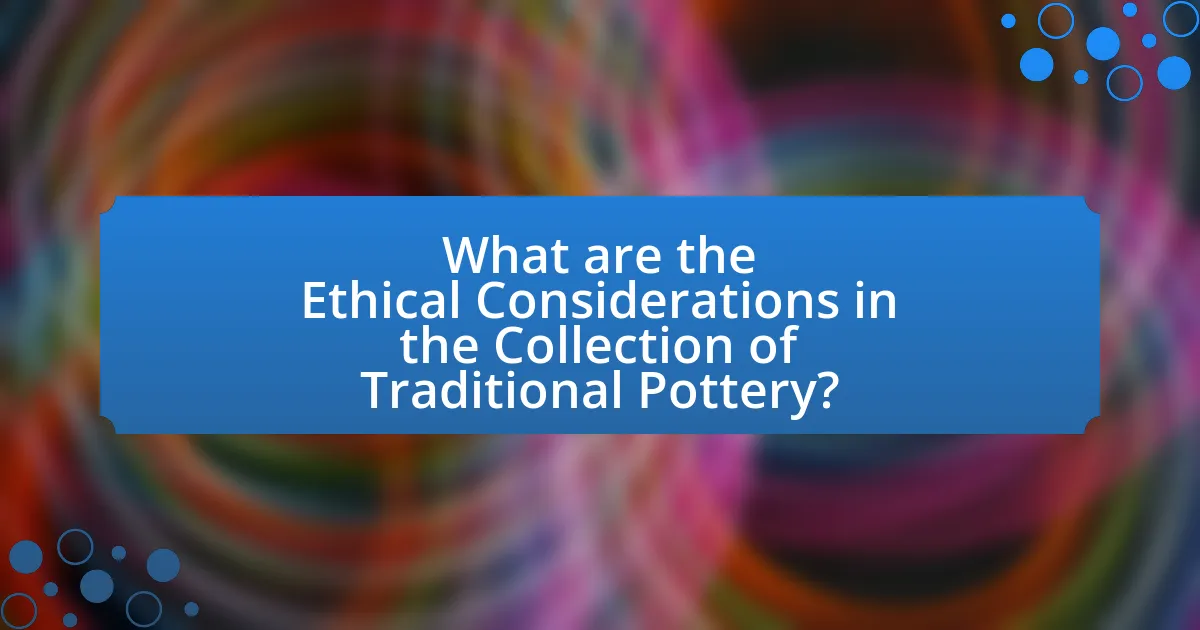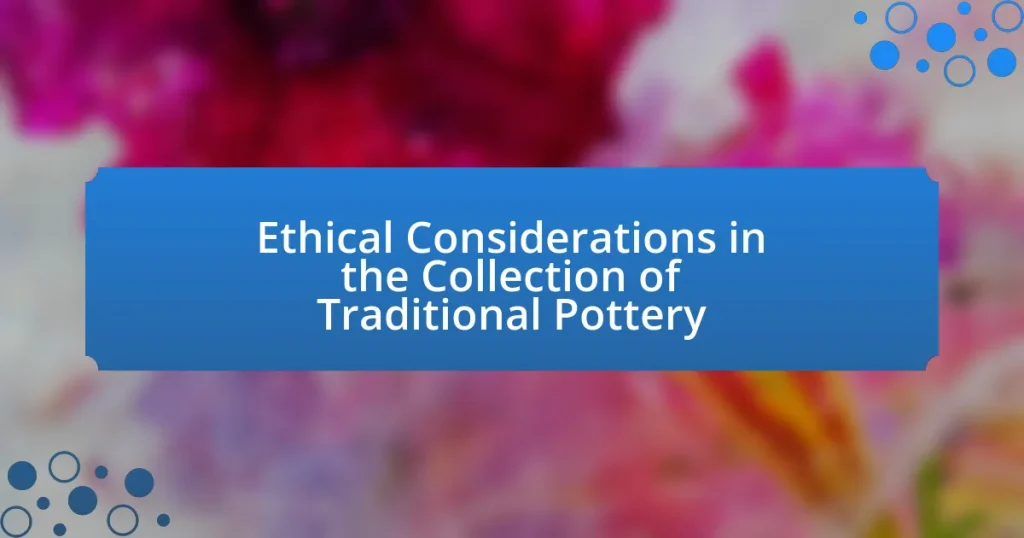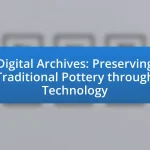The article focuses on the ethical considerations involved in the collection of traditional pottery, emphasizing the importance of respecting cultural heritage, the rights of indigenous communities, and legal acquisition practices. It outlines the significance of ethical collection in preserving cultural identity and preventing exploitation, while also addressing historical factors such as colonialism and cultural appropriation that influence contemporary collecting ethics. The article discusses the potential consequences of unethical practices, including cultural loss and legal ramifications, and provides guidelines for collectors to ensure ethical sourcing, community engagement, and adherence to international laws. Additionally, it highlights the role of museums and organizations in promoting ethical standards and offers practical tips for collectors to foster respectful relationships with traditional pottery makers.

What are the Ethical Considerations in the Collection of Traditional Pottery?
The ethical considerations in the collection of traditional pottery include respect for cultural heritage, the rights of indigenous communities, and the legality of acquisition. Collectors must ensure that the pottery is obtained with consent from the originating culture, as many traditional pieces hold significant cultural and spiritual value. Additionally, the provenance of the pottery should be clear to avoid supporting illegal trade or looting, which can harm the communities from which these artifacts originate. Ethical collecting practices emphasize transparency, collaboration with local communities, and adherence to international laws, such as the UNESCO Convention on the Means of Prohibiting and Preventing the Illicit Import, Export, and Transfer of Ownership of Cultural Property.
Why is ethical collection important in the context of traditional pottery?
Ethical collection is important in the context of traditional pottery because it ensures the preservation of cultural heritage and respects the rights of indigenous communities. Collecting pottery ethically involves obtaining items through fair practices, which helps prevent exploitation and cultural appropriation. For instance, the UNESCO Convention on the Means of Prohibiting and Preventing the Illicit Import, Export, and Transfer of Ownership of Cultural Property emphasizes the need for ethical standards in the acquisition of cultural artifacts. This framework supports the idea that traditional pottery should be collected in a manner that honors its cultural significance and the communities that create it, thereby fostering sustainable practices and promoting cultural awareness.
What historical factors influence the ethics of collecting traditional pottery?
Historical factors that influence the ethics of collecting traditional pottery include colonialism, cultural appropriation, and the impact of archaeological practices. Colonialism often led to the exploitation of indigenous cultures, resulting in the removal of traditional pottery from their original contexts, which raises ethical concerns about ownership and cultural heritage. Cultural appropriation further complicates these ethics, as the commodification of traditional pottery by collectors can disrespect the cultural significance it holds for the originating communities. Additionally, archaeological practices, particularly in the 19th and early 20th centuries, often prioritized Western perspectives, leading to the unethical excavation and collection of artifacts without proper consent or consideration for the cultural narratives of the communities involved. These historical contexts shape contemporary discussions on the ethical implications of collecting traditional pottery.
How do cultural sensitivities impact the ethical considerations of collection?
Cultural sensitivities significantly impact the ethical considerations of collection by necessitating respect for the beliefs, practices, and values of the communities from which traditional pottery originates. When collectors disregard these sensitivities, they risk perpetuating colonial attitudes and causing harm to cultural heritage, as seen in instances where artifacts are removed without consent, leading to community disempowerment. For example, the 1970 UNESCO Convention emphasizes the importance of obtaining permission from source communities, highlighting that ethical collection practices must align with cultural values to ensure that the rights and dignity of those communities are upheld.
What are the potential consequences of unethical collection practices?
Unethical collection practices can lead to significant cultural, legal, and social consequences. Culturally, these practices can result in the loss of heritage and identity for communities, as traditional pottery often holds historical and cultural significance. Legally, individuals or organizations engaging in unethical collection may face lawsuits, fines, or sanctions, as many countries have laws protecting cultural artifacts. Socially, such practices can erode trust between collectors and communities, leading to community backlash and diminished cooperation in future cultural preservation efforts. For instance, the UNESCO Convention on the Means of Prohibiting and Preventing the Illicit Import, Export, and Transfer of Ownership of Cultural Property emphasizes the importance of ethical practices in the collection of cultural artifacts, highlighting the legal ramifications of unethical actions.
How can unethical collection affect indigenous communities?
Unethical collection can severely impact indigenous communities by undermining their cultural heritage and economic stability. When artifacts, such as traditional pottery, are collected without consent or proper context, it strips these communities of their historical narratives and cultural identity. For instance, the removal of pottery can lead to a loss of traditional knowledge and practices associated with its creation, as seen in various cases where indigenous artisans have been marginalized due to the commodification of their cultural expressions. Additionally, unethical collection can result in economic disadvantages, as communities may lose potential revenue from tourism or cultural education that could arise from their artifacts being displayed in their original context. This dynamic perpetuates a cycle of exploitation and disempowerment, further alienating indigenous peoples from their cultural resources and heritage.
What legal implications arise from unethical collection of traditional pottery?
Unethical collection of traditional pottery can lead to significant legal implications, including violations of cultural heritage laws and international treaties. Such actions may contravene the UNESCO Convention on the Means of Prohibiting and Preventing the Illicit Import, Export, and Transfer of Ownership of Cultural Property, which aims to protect cultural heritage from illegal trade. Additionally, collectors may face legal repercussions under national laws that protect indigenous rights and cultural property, such as the Native American Graves Protection and Repatriation Act in the United States, which mandates the return of cultural items to Native American tribes. These legal frameworks underscore the importance of ethical practices in the collection of traditional pottery to avoid legal penalties and promote respect for cultural heritage.

How can collectors ensure ethical practices in their collection of traditional pottery?
Collectors can ensure ethical practices in their collection of traditional pottery by sourcing items directly from artisans or communities, thereby supporting local economies and preserving cultural heritage. Engaging with the community allows collectors to understand the significance of the pottery and ensures that the artisans receive fair compensation for their work. Additionally, collectors should verify the provenance of each piece to confirm that it was not obtained through illegal means or cultural appropriation. Research indicates that ethical sourcing can enhance the sustainability of traditional crafts, as seen in initiatives like the UNESCO Intangible Cultural Heritage program, which promotes the safeguarding of traditional practices.
What guidelines should collectors follow to maintain ethical standards?
Collectors should follow guidelines that prioritize provenance, respect cultural significance, and ensure legal compliance to maintain ethical standards. Provenance involves verifying the history of the pottery, ensuring it was acquired legally and ethically, which helps prevent the trade of stolen or looted artifacts. Respecting cultural significance means acknowledging and honoring the traditions and practices of the communities from which the pottery originates, avoiding exploitation or misrepresentation. Legal compliance requires adherence to local and international laws regarding the collection and trade of cultural artifacts, such as the UNESCO Convention on the Means of Prohibiting and Preventing the Illicit Import, Export, and Transfer of Ownership of Cultural Property. These guidelines collectively promote responsible collecting practices that safeguard cultural heritage.
How can collectors verify the provenance of traditional pottery?
Collectors can verify the provenance of traditional pottery by examining documentation, such as receipts, certificates of authenticity, and historical records. These documents often provide a traceable history of ownership and origin, which is crucial for establishing authenticity. Additionally, collectors can consult experts in pottery appraisal and authentication, who can analyze the pottery’s materials, techniques, and stylistic features to confirm its origin. Provenance research may also involve checking museum archives or databases that track the history of specific pieces. This multi-faceted approach ensures that collectors can substantiate the authenticity and ethical sourcing of traditional pottery.
What role do museums and institutions play in promoting ethical collection practices?
Museums and institutions play a crucial role in promoting ethical collection practices by establishing guidelines and standards that prioritize provenance, cultural sensitivity, and community engagement. These organizations often implement policies that require thorough documentation of the origins of artifacts, ensuring that items are acquired legally and ethically. For instance, the American Alliance of Museums emphasizes the importance of ethical stewardship, which includes respecting the rights of source communities and adhering to international agreements like the UNESCO Convention on the Means of Prohibiting and Preventing the Illicit Import, Export, and Transfer of Ownership of Cultural Property. By fostering partnerships with indigenous groups and local communities, museums can facilitate dialogue and collaboration, thereby enhancing the ethical dimensions of their collections.
What are the best practices for engaging with indigenous communities?
The best practices for engaging with indigenous communities include establishing trust, respecting cultural protocols, and ensuring meaningful participation. Trust can be built through consistent communication and transparency about intentions and actions. Respecting cultural protocols involves understanding and honoring the traditions, languages, and customs of the community, which can vary significantly among different groups. Meaningful participation ensures that community members have a voice in decision-making processes, particularly regarding projects that affect their cultural heritage, such as the collection of traditional pottery. Research indicates that projects involving indigenous communities are more successful when they prioritize these practices, as evidenced by the collaborative efforts documented in the “Indigenous Participation in Research” report by the National Indigenous Research Institute, which highlights the importance of community engagement in achieving ethical outcomes.
How can collectors build respectful relationships with traditional pottery makers?
Collectors can build respectful relationships with traditional pottery makers by engaging in open communication and demonstrating genuine appreciation for their craft. Establishing dialogue allows collectors to understand the cultural significance and techniques behind the pottery, fostering mutual respect. Additionally, collectors should prioritize fair compensation for the pottery, ensuring that makers receive a just reward for their work, which supports their livelihoods and preserves their traditions. Research indicates that ethical collecting practices, such as transparency in sourcing and collaboration with artisans, enhance trust and strengthen relationships within the community.
What are the benefits of collaborating with indigenous communities in pottery collection?
Collaborating with indigenous communities in pottery collection enhances cultural preservation and promotes ethical practices. This partnership allows for the safeguarding of traditional knowledge and techniques that are integral to the community’s identity. For instance, indigenous artisans possess unique insights into the historical significance and cultural context of their pottery, which can enrich the understanding and appreciation of these artifacts. Furthermore, collaboration fosters economic opportunities for indigenous communities, as it can lead to fair compensation for their craftsmanship and knowledge. Studies have shown that such partnerships can result in sustainable practices that benefit both the collectors and the communities involved, ensuring that the cultural heritage is respected and maintained for future generations.

What resources are available for collectors to learn about ethical considerations?
Collectors can access various resources to learn about ethical considerations in the collection of traditional pottery, including academic journals, books, online courses, and guidelines from professional organizations. For instance, the “Journal of Cultural Heritage” publishes peer-reviewed articles that address ethical issues in collecting practices. Additionally, books such as “The Ethics of Collecting Cultural Property” by Steven C. Dubin provide comprehensive insights into the moral implications of collecting. Online platforms like Coursera offer courses on cultural heritage management that cover ethical considerations. Furthermore, organizations like the American Alliance of Museums provide ethical guidelines and best practices for collectors, emphasizing the importance of provenance and cultural sensitivity.
Where can collectors find educational materials on ethical pottery collection?
Collectors can find educational materials on ethical pottery collection through various reputable sources such as museums, academic institutions, and online platforms dedicated to cultural heritage. Museums often provide resources and workshops focused on ethical collecting practices, while universities may offer courses or publications on the subject. Additionally, organizations like the International Council of Museums (ICOM) and the Association of Art Museum Directors (AAMD) publish guidelines and educational materials that emphasize ethical considerations in collecting. These resources help collectors understand the importance of provenance, cultural sensitivity, and legal compliance in their collecting practices.
What organizations focus on ethical practices in the collection of traditional artifacts?
Organizations that focus on ethical practices in the collection of traditional artifacts include the International Council of Museums (ICOM), the Association of Art Museum Directors (AAMD), and the American Alliance of Museums (AAM). ICOM promotes ethical standards through its Code of Ethics for Museums, which emphasizes the importance of respecting cultural heritage and the rights of source communities. AAMD advocates for responsible collecting practices and encourages museums to engage with communities regarding the provenance of artifacts. AAM provides guidelines that support ethical stewardship and the responsible management of collections. These organizations collectively work to ensure that the collection and exhibition of traditional artifacts are conducted with integrity and respect for cultural significance.
What practical tips can collectors implement for ethical collection of traditional pottery?
Collectors can implement several practical tips for the ethical collection of traditional pottery, including sourcing items directly from artisans or reputable galleries that support local communities. This approach ensures that the artisans receive fair compensation for their work, promoting sustainable practices. Additionally, collectors should research the cultural significance and provenance of the pottery to avoid acquiring items that may have been illegally obtained or that disrespect the cultural heritage of the communities they originate from. Engaging with local communities and understanding their traditions can further enhance ethical practices, as it fosters respect and appreciation for the art form.


